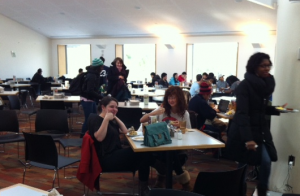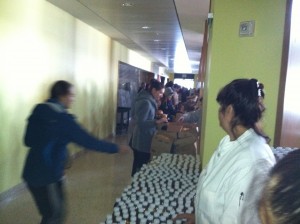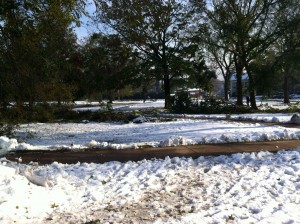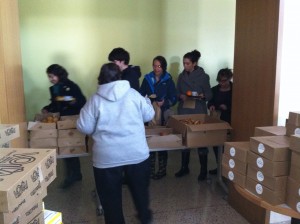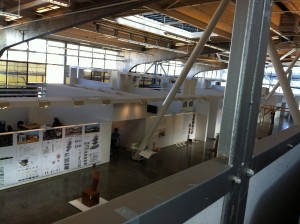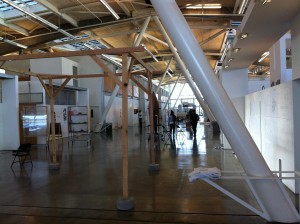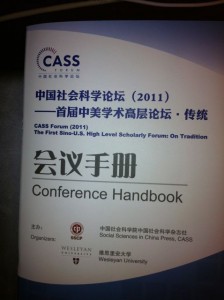I was headed into New York this week for some alumni meetings, and everybody was talking about an article in this week’s Observer and Betabeat about the Wesleyan impact on digital media companies in the Big Apple. I’m reminded of Vanity Fair’s saying that this little Connecticut university dominated Hollywood, or how Spin and the Village Voice talked about the Wes-Williamsburg axis dominating independent contemporary music.
It’s very cool to see the work of the Wes family recognized. Here’s the Observer article by Wes grad Ben Popper ’05:
How Wesleyan’s Counter Culture Came To Rule New York’s Tech Scene
The offices of Zelnick Media were packed on a recent evening for #DigitalWes, an alumni gathering for the graduates of Wesleyan University who had made their way from jam bands and cultural theory to the warp-speed world of Silicon Alley. Guests nibbled shrimp and steak skewers while taking in a sumptuous view of midtown Manhattan from the roof deck. The hosts were Strauss Zelnick and his partner, Jim Friedlich, both class of ’79, whose Take Two Interactive has produced some of the best-selling and most controversial video games of the past decade.
“It’s the kind of school, if you told people you wanted to end up at Goldman Sachs, they would probably chase you out of the dorm,” said John Borthwick, class of ’87, a double major in developmental economics and art history and co-founder of the Chelsea-based betaworks. “Radical transparency, open access to information, disrupting traditional media, these were the secret handshakes at Wesleyan.”
The term Wesleyan Mafia has long been used to describe a cadre of graduates in Hollywood: successful directors, studio heads and writers. In music, too, graduates of the small liberal arts college in Middletown, Conn.—about two hours from New York—have had unusual critical success that stirred talk of a Connecticut Cosa Nostra. But it’s less surprising to hear that Michael Bay and MGMT attended Wesleyan, since the school is well known for its film and music departments. While computer science has never been among Wesleyan’s specialties, alumni seem to have found an especially prominent place of late among Silicon Alley’s elite. (Disclosure: the author graduated from Wesleyan, though he’s hardly among the elite just yet.)
At the party Mr. Borthwick clustered with Andy Weissman, his co-founder at betaworks, and Stuart Ellman, co-founder of RRE Ventures. RRE is one of the biggest investors in New York, with 29 portfolio companies in Silicon Alley backed by some of the $850 million they have under management. Mr. Weissman is a venture capitalist as well, having in fact recently left betaworks to join Union Square Ventures, New York’s most well-known venture fund and one of the top performing V.C. shops in the nation. The three firms have partnered on a number of high-profile seed stage investments in New York, and RRE is a backer of betaworks.
It’s the countercultural lessons learned at Wesleyan that laid the foundation for the alumni’s success in Silicon Alley, they said. “The forefathers and mothers of the internet came out of the ’60s ethic of distributed information and power,” Mr. Borthwick said. “There is an organizing ethic, which is why I suspect you see fewer Wesleyan grads at companies like Facebook, which has a very centralized view of the world.” Sure, he built and invested in promising companies like chartbeat, bit.ly, tumblr, kickstarter and GroupMe. But Mr. Borthwick began his career as a idealistic dot-com pioneer, keen to marry the worlds of art and the web, who produced avant garde websites like äda’web, total NY and Spanker.
Fred Wilson, New York’s most prominent investor, is an M.I.T. graduate, but his co-founder at Union Square Ventures is Brad Burnham, Wesleyan class of ’77. Mr. Wilson was in the next room over, chatting with Chris Dorr, class of ’74. “Filmmakers and software developers need to be sleeping together, and it is starting to happen,” Mr. Dorr declared. Outside on the roof deck, Mr. Wilson’s daughter, currently a sophomore at Wesleyan, talked about preparing for her semester abroad.
Betabeat bumped into Adam and Todd Stone, a pair of twin brothers whom we remembered as Stone and Stone, a comedy duo that mixed dirty jokes with Broadway show tunes. Their act had always been a sort of amplified, absurdist version of Borscht Belt humor performed by what seemed like the living essence of Scarsdale Jewry.
“We tried the whole Hollywood thing, but the people out there didn’t work for us,” Adam said.
“Now we’re thinking about trying our luck in the tech scene,” said brother Todd, who was finishing up a stint as an intern at Business Insider, where he had penned the massively successful slideshows: Ten Sexiest Programmers and Ten Sexiest VCs.
Would their new start-up have any connection to their act, The Observer asked? “We’re still working on that, but it will be something we’re passionate about,” Adam said.
“Either that or twin porn, which seems to be really big on the Internet,” Todd concluded.
The crowd settled to a dull murmur as Wesleyan president Michael Roth stood in the center of the room. A former professor known for his jazz piano skills and formidably tight jeans, he was making his first foray to the tech event . “All across this country, the notion of a liberal arts education is under attack,” Mr. Roth declared. “But looking around this room tonight it’s clear to me that the skills we teach are becoming increasingly relevant in the digital age.”
Digital Wesleyan was not, of course, started as an networking effort on the part of the university. “This isn’t Harvard or Stanford—we’re actually really bad at organizing these kinds of alumni events,” Mr. Borthwick noted. “But the young Wesleyan people in tech, they’re popping up fucking everywhere.”
The events were in fact the initiative of a young graduate named Jake Levine. Betabeat found him huddled with Union Square’s Brad Burnham, debating the best way to keep the Internet free from corporate interference.
“It’s not always in the interest of the incumbent players to innovate,” Mr. Burnham explained. It’s a topic he knows firsthand, having begun his career at AT&T, a company notorious for eating its young when it comes to disruptive technologies. There Mr. Burnham, a decade older than his alumni peers, helped to build AT&T Ventures, a shop charged with the difficult task of finding promising new technologies within the strictures of a recalcitrant monopoly.
Mr. Levine had just finished reading Yochai Benkler’s The Wealth of Networks and began asking Mr. Burnham for more insight. “I never heard such a clear, concise explanations of how patent law encourages and stifles innovation,” he declared.
Mr. Burnham shook his head. “What I envy about someone like you or Benkler is the clarity of thinking. It’s like an early Maoist. You know where you want to go and don’t concern yourself with the obstacles along the way.”
The younger set at the event comprised mostly entrepreneurs, who are just as numerous, if not as powerful yet, as Wesleyan’s tech investors. Mr. Levine was working as an analyst at The Ladders when he began organizing Digital Wes. Early this year he was offered a spot as an entrepreneur-in-residence at betaworks, and four months later took a job as general manager at News.me, the social reader from betaworks backed by The New York Times.
“The people in this room where the ones who gave me my first advice,” said Dina Kaplan, co-founder of blip.tv. “At the time we started, none of us had run a business. We just had a vision for something we believed in.”
Jordan Goldman, whose acceptance to Wesleyan was chronicled in the New York Times best-seller The Gatekeepers, found funding for his first company by cold-calling the Wesleyan alumni network. “There is a very deep base here that young entrepreneurs can tap into,” confirmed Mr. Goldman, founder of Unigo, an online college guide that just raised $1.6 million from McGraw Hill. “These were the folks that got me started.”
Mr. Goldman was showing Christopher Lake, ’05, around the party, pointing out the various big names he should meet. Mr. Lake had just left an analyst position at McKinsey to try his hand at business development in the start-up world. “It’s a real eye-opener, especially compared to some of the Wes alumni at finance events I attended,” Mr. Lake said. “You’d meet a few investment bankers, a few hedge fund guys, none of whom you’d ever heard of, along with a gaggle of recent grads trying to break into the world. In that scene you get the feeling that Wesleyan will always be an also-ran. In tech, we’re distinct.”
In the elevator heading home, Betabeat met Kai Bond, from Hatch Labs, who had been chatting with several of the investors in attendance. Typically the process of finding funding for a start-up is a challenging one. Investors like to rake a new project over the coals before they commit capital. But for better or worse, the Wesleyan connection seems to have streamlined that process. “When you come to an event like this, it’s not, ‘Pitch me your idea,’” Mr. Bond noted. “It’s more like, ‘Come in for a meeting and let’s find an idea we can get behind.’”



